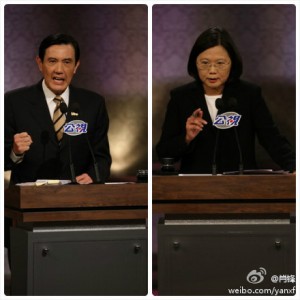The first of three televised debates in Taiwan's upcoming presidential election was held this weekend, and watched closely by mainland Chinese microbloggers.
MoveOn.org.tw
Ma Ying-jeou still leads the Kuomintang (KMT), but the Democratic Progressive Party (DPP), now rid of Chen Shui-bian, looks ready to make a comeback headed by Taiwan's first female presidential candidate, Tsai Ing-wen.
A third candidate, James Soong, has registered as a candidate but says he'll only follow through if he can get a million signatures.
People were able to watch the debate live through various browser-based streaming TV feeds, and clips of it have have been posted to all the major video websites, but the discussion has centered around Sina Weibo. Many viewers expecting something as lively as a US Republic Party primary debate wound up disappointed, and a lot of ‘livetweet’ online discussion sought to point out what many accept as obvious:
大明宫梦锦瑟年华:真的是民主,既然台湾可以这样,中国也可以这样子。
鸣者自在:台湾最寻常的民主政治被天朝屁民像看即将被取缔的超女总决赛一样娱乐围观。
薛蛮子: 请教专家,全世界不民主选举领导人的国家:朝鲜;古巴。还有吗?有木有?
Carrying on with Sina Weibo's legacy of turning lies into ‘fact’, discussion there leading up to the debate even prompted Weibo Piyao, the microblogging platform's official rumor-quashing account to write:
近日有用户发布微博,称马英九提出必须在“代表自由、代表民主、代表公平”前提下谈统一。@微博辟谣 就此联系了马英九竞选总部发言人李佳霏,对方否认马英九曾发表此言论。因此,该用户账号已被注销。
From Wikipedia, ‘Republic of China presidential election, 2012′ (12/04/2011):
One big election topic appears to be the 1992 consensus, a term describing the outcome of a meeting in 1992 between the semi-official representatives of the People's Republic of China and the Republic of China. The KMT is putting this consensus forward, which aims to be more democratic and to be ratified by the legislature and a referendum for ROC citizens. Under the DPP's new consensus, this should be the basis for negotiations with the PRC.
According to some news junkies, however, in comparison to Taiwan's 2008 presidential election, more Chinese netizen attention was focused during this debate on issues other than just the future of cross-Strait relations. Phoenix blogger Zheng Dongyang covered the whole range of issues, domestic policies included, in his lengthy post about the things which interested him in this debate. With regard to the debate over reunification vs. independence, however, Zheng writes:
个人认为,虽然现在说谁能胜出为时尚早,但可以预见的是,即将到来的选举将是台湾民主化后最理性和温和的选举。民进党利用群众街头运动帮助选情,打悲情牌、族群牌、省籍牌、统独牌的情况会越来越少,虽然其两岸政策虽然摆脱不了“台独”思维,但也不会像陈水扁一样,不断挑战大陆的底线。而国民党也将重心放在政策诉求上,随着马英九的闽南话的日趋流利,他出现在台湾南部的次数越来越多。
这次电视辩论给我的感觉是,如果“统独”之争过去是蓝绿给台湾民众的传统印象,而如今双方施政政策也在民众形成一个新的烙印。传统的“浊水溪”线正在逐渐淡化,双方都将中间选民视为可以团结的对象,而中间选民大多数支持两岸关系维持现状,没有历史包袱,更看重的是两个政党的具体政策是否有利其事业发展及生活质量取得改善,这是过去选举给台湾选民带来的变化。
What I feel with this televised debate, though, is that if the lasting impression the blue and green camps have given the Taiwanese public is their division over the issue of








4 comments
Correction: “统一” in English is “unification,” not “reunification” (回歸). Taiwan has never been part of the PRC, so please don’t use the “re-” word unless it’s a direct quote.
Thanks for pointing out the mistake, corrections made.
Thanks for at least striking through the “re-” part. It’s an important distinction that is often missed.
Zheng’s post is interesting because it shows that Chinese observers really are gaining sophistication about Taiwanese politics although the conclusions are still often wishful thinking. The more rational nature of the campaign probably has more to do with Tsai’s character than any fundamental shift in how the DPP conducts its politics.
Ma’s Taiwanese (Minnan) is not getting any noticeably better and his trips to the south aren’t doing much. The Zhuoshui river remains a dividing line between green and blue and if anything the line is moving north. The absence of debate on independence is not a sign of the ‘historical burden’ being put down. It’s simply a consensus that Taiwan has no common future with China.